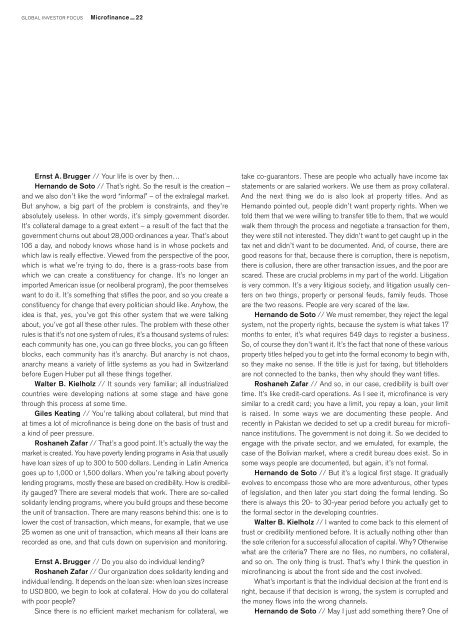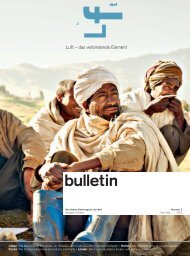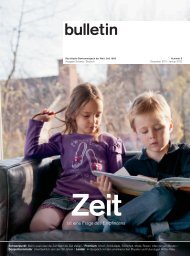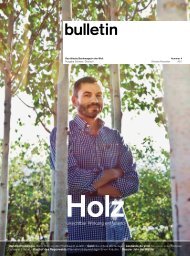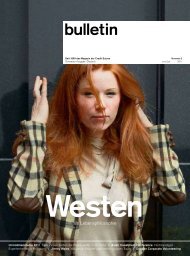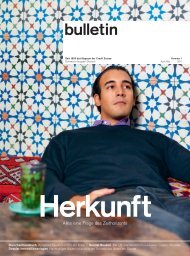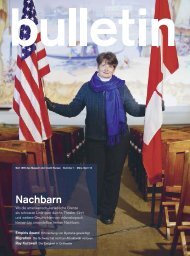Microfinance
Global Investor Focus, 02/20065 Credit Suisse
Global Investor Focus, 02/20065
Credit Suisse
Create successful ePaper yourself
Turn your PDF publications into a flip-book with our unique Google optimized e-Paper software.
GLOBAL INVESTOR FOCUS<br />
<strong>Microfinance</strong>—22<br />
Ernst A. Brugger // Your life is over by then…<br />
Hernando de Soto // That’s right. So the result is the creation –<br />
and we also don’t like the word “informal” – of the extralegal market.<br />
But anyhow, a big part of the problem is constraints, and they’re<br />
absolutely useless. In other words, it’s simply government disorder.<br />
It’s collateral damage to a great extent – a result of the fact that the<br />
government churns out about 28,000 ordinances a year. That’s about<br />
106 a day, and nobody knows whose hand is in whose pockets and<br />
which law is really effective. Viewed from the perspective of the poor,<br />
which is what we’re trying to do, there is a grass-roots base from<br />
which we can create a constituency for change. It’s no longer an<br />
imported American issue (or neoliberal program), the poor themselves<br />
want to do it. It’s something that stifles the poor, and so you create a<br />
constituency for change that every politician should like. Anyhow, the<br />
idea is that, yes, you’ve got this other system that we were talking<br />
about, you’ve got all these other rules. The problem with these other<br />
rules is that it’s not one system of rules, it’s a thousand systems of rules:<br />
each community has one, you can go three blocks, you can go fifteen<br />
blocks, each community has it’s anarchy. But anarchy is not chaos,<br />
anarchy means a variety of little systems as you had in Switzerland<br />
before Eugen Huber put all these things together.<br />
Walter B. Kielholz // It sounds very familiar; all industrialized<br />
countries were developing nations at some stage and have gone<br />
through this process at some time.<br />
Giles Keating // You’re talking about collateral, but mind that<br />
at times a lot of microfinance is being done on the basis of trust and<br />
a kind of peer pressure.<br />
Roshaneh Zafar // That’s a good point. It’s actually the way the<br />
market is created. You have poverty lending programs in Asia that usually<br />
have loan sizes of up to 300 to 500 dollars. Lending in Latin America<br />
goes up to 1,000 or 1,500 dollars. When you’re talking about poverty<br />
lending programs, mostly these are based on credibility. How is credibility<br />
gauged? There are several models that work. There are so-called<br />
solidarity lending programs, where you build groups and these become<br />
the unit of transaction. There are many reasons behind this: one is to<br />
lower the cost of transaction, which means, for example, that we use<br />
25 women as one unit of transaction, which means all their loans are<br />
recorded as one, and that cuts down on supervision and monitoring.<br />
Ernst A. Brugger // Do you also do individual lending?<br />
Roshaneh Zafar // Our organization does solidarity lending and<br />
individual lending. It depends on the loan size: when loan sizes increase<br />
to USD 800, we begin to look at collateral. How do you do collateral<br />
with poor people?<br />
Since there is no efficient market mechanism for collateral, we<br />
take co-guarantors. These are people who actually have income tax<br />
statements or are salaried workers. We use them as proxy collateral.<br />
And the next thing we do is also look at property titles. And as<br />
Hernando pointed out, people didn’t want property rights. When we<br />
told them that we were willing to transfer title to them, that we would<br />
walk them through the process and negotiate a transaction for them,<br />
they were still not interested. They didn’t want to get caught up in the<br />
tax net and didn’t want to be documented. And, of course, there are<br />
good reasons for that, because there is corruption, there is nepotism,<br />
there is collusion, there are other transaction issues, and the poor are<br />
scared. These are crucial problems in my part of the world. Litigation<br />
is very common. It’s a very litigious society, and litigation usually centers<br />
on two things, property or personal feuds, family feuds. Those<br />
are the two reasons. People are very scared of the law.<br />
Hernando de Soto // We must remember, they reject the legal<br />
system, not the property rights, because the system is what takes 17<br />
months to enter, it’s what requires 549 days to register a business.<br />
So, of course they don’t want it. It’s the fact that none of these various<br />
property titles helped you to get into the formal economy to begin with,<br />
so they make no sense. If the title is just for taxing, but titleholders<br />
are not connected to the banks, then why should they want titles.<br />
Roshaneh Zafar // And so, in our case, credibility is built over<br />
time. It’s like credit-card operations. As I see it, microfinance is very<br />
similar to a credit card; you have a limit, you repay a loan, your limit<br />
is raised. In some ways we are documenting these people. And<br />
recently in Pakistan we decided to set up a credit bureau for microfinance<br />
institutions. The government is not doing it. So we decided to<br />
engage with the private sector, and we emulated, for example, the<br />
case of the Bolivian market, where a credit bureau does exist. So in<br />
some ways people are documented, but again, it’s not formal.<br />
Hernando de Soto // But it’s a logical first stage. It gradually<br />
evolves to encompass those who are more adventurous, other types<br />
of legislation, and then later you start doing the formal lending. So<br />
there is always this 20- to 30-year period before you actually get to<br />
the formal sector in the developing countries.<br />
Walter B. Kielholz // I wanted to come back to this element of<br />
trust or credibility mentioned before. It is actually nothing other than<br />
the sole criterion for a successful allocation of capital. Why? Otherwise<br />
what are the criteria? There are no files, no numbers, no collateral,<br />
and so on. The only thing is trust. That’s why I think the question in<br />
microfinancing is about the front side and the cost involved.<br />
What’s important is that the individual decision at the front end is<br />
right, because if that decision is wrong, the system is corrupted and<br />
the money flows into the wrong channels.<br />
Hernando de Soto // May I just add something there? One of


